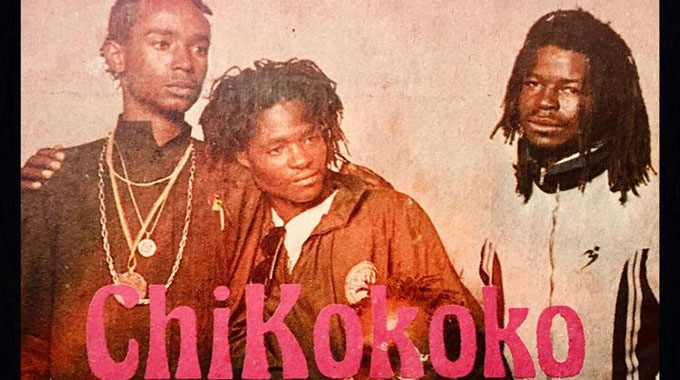Natural talent disappearing due to recording studios influx

Clive Mono-Mukundu Own Correspondent
Born on September 5, 1970, during the liberation war means that when the country gained independence, I was nine-years-old.
I witnessed a few things that took place during that period, from gunshots to bombs in rural areas, especially each time I visited my grandmother.
I experienced the joy and euphoria when Uhuru came and it is during the same time that I started showing interest in music.
I made myself a homemade guitar.
The social and political atmosphere always has a huge impact on the arts, particularly the music industry.
Likewise, during the 1980s the Zimbabwe music scene was full of political songs celebrating independence.
I started composing music around 1985, and my first songs carried the same messages as the music that was being released then.
The coming of Bob Marley to perform during Zimbabwe’s independence celebrations in April 1980 ushered in reggae music into the country, like most youngsters of my time became huge fanatics.
My dream was to become a reggae artist, therefore the first 200 original songs I wrote were all of that genre.
The nickname “Mono” which is more recognisable than my official first name Clive, also came about as a result of reggae music to some extent.
During my school days, I used to have a single dreadlock that I used to hide in my Afro hair. We used to call it a Mono-Lock, so my friends shortened the name to Mono.
I later formed my first band, “The Sarungano Chanter” in 1988. A year later we disbanded, then moved to Chax Brothers in 1989 with the likes of Admire Kasenga.
I failed to record with these first two bands because we failed auditions countless times as there were few and competitive recording studios .
My career as a recording artiste only started when I managed to be recorded in 1992 with Somandla Ndebele and Chikokoko Band.
Because of my guitar skills, I became a sought-after guitarist and to date I have been featured on more than a thousand albums.
There have been major changes in the music industry, from pre-independence, independence and post-year 2000.
Before year 2000, Zimbabwe had vibrant recording companies like Gramma Records, Radio and Tape Promotions (RTP) and Zimbabwe Music Corporation (ZMC) dating back to the 1970s.
They scouted for talent, recorded the artistes, covered everything from recording, video costs to marketing the music, then they would recoup the money they would have invested through record sales, now it is those record sales that were struck very hard by music piracy.
As a result, all major record labels disappeared and it is the same period that digital music studios appeared all over too.
Having many studios around is not a bad thing by the way, that is the way it is worldwide since recording equipment has become smaller and cheaper.
American artiste Curtis Fields even recorded a full album on an iPhone and won a BET award for the album in 2013, the only problem is the lack of record labels and all the advantages they bring.
When people hear that countries like South Africa and Nigeria also have piracy, they make a mistake of thinking that the problem is affecting them the very same way as it is affecting Zimbabwe. However, it is different as artistes are still buying houses through music sales in those countries while artistes in Zimbabwe cannot even buy a pair of slippers with music sales.
What makes it worse is that Zimbabweans have not yet warmed up to buying music online, they still prefer hard copies.
Zimbabwean has good anti-piracy laws, but the problem is implementation. As a result, being an artiste currently is very difficult than in years gone by.
The collapse of record labels meant the death of talent-scouting, ushering in the cash system.
For one to have his music recorded, these days what is needed most is money, not talent.
As a result, this is lowering the quality of music being released.
Record labels were helpful in marketing musicians, just look at the number of international artistes that were produced during the record labels period, the likes of Thomas Mapfumo, Chiwoniso Maraire, Bhundu Boys, Oliver Mtukudzi and Stella Chiweshe among others, and now we have less international artistes with Mokoomba being our biggest export.
Due to the influx of studios in every corner in Zimbabwe, studio time lost its value, artists no longer go to the studio prepared as much as the analogue artists used to do.
When working with artists you can easily tell who started their careers during the analogue era or those that started their careers during the digital era.
I produced a number of collaborations, when artistes collaborated with the digital era artistes every time the featured artistes comes and asks for a pen and paper to write lyrics, even if he was given the music a week to a month earlier, but every time when the featured artiste was a yesteryear artiste who started in the analogue era the artiste would come fully prepared, having thoroughly listened to the music, as well as having practiced their vocal parts.
In 2012 I did a collaboration with the late Oliver Mtukudzi on the song titled Jean, I gave him the CD a week earlier for him to rehearse. By the time he came for the session, he had thoroughly rehearsed it, he just did one take, so after five minutes we were done.
Another big challenge came with the economic challenges partly due to sanctions imposed on Zimbabwe.
The music industry was hit the most and surviving sorely on music is proving to be very difficult.
As an artiste, I survived in the cut-throat business of music because before I joined the industry I took time to study how it is run.
By the time I first set my foot in the game and was faced with all the setbacks, I was not even surprised, because I had read all about it.
Concerning finances, I had read and understood the dynamics between times of plenty and times of drought in the music industry and the need for every musician to save and invest.
So when such cases came like for example when we were fired from Oliver Mtukudzi’s Black Spirits in 2007, I was more than prepared, I had money saved and had invested in a music studio which was up and running providing a steady income, the only difference was that I was not flying so frequently as when I was with the band.
That also prevented me from being bitter with Tuku, so we remained friends and I carried on working with him part-time till he passed away in January 2019. I also read everything about groupies in the music industry.
When I entered the industry and saw all the women that throw themselves at musicians I was not shocked, it was just a confirmation of what I had read.
This is one area that wiped off a good number of great musicians in Zimbabwe and the world over especially during the mid to the late 90s.
As we celebrate Zimbabwe at 40, we thank God for surviving through all the tough times that we faced as a country. We thank God for the love that we have for the arts, even though music is not rewarding much, we soldier on.









Comments